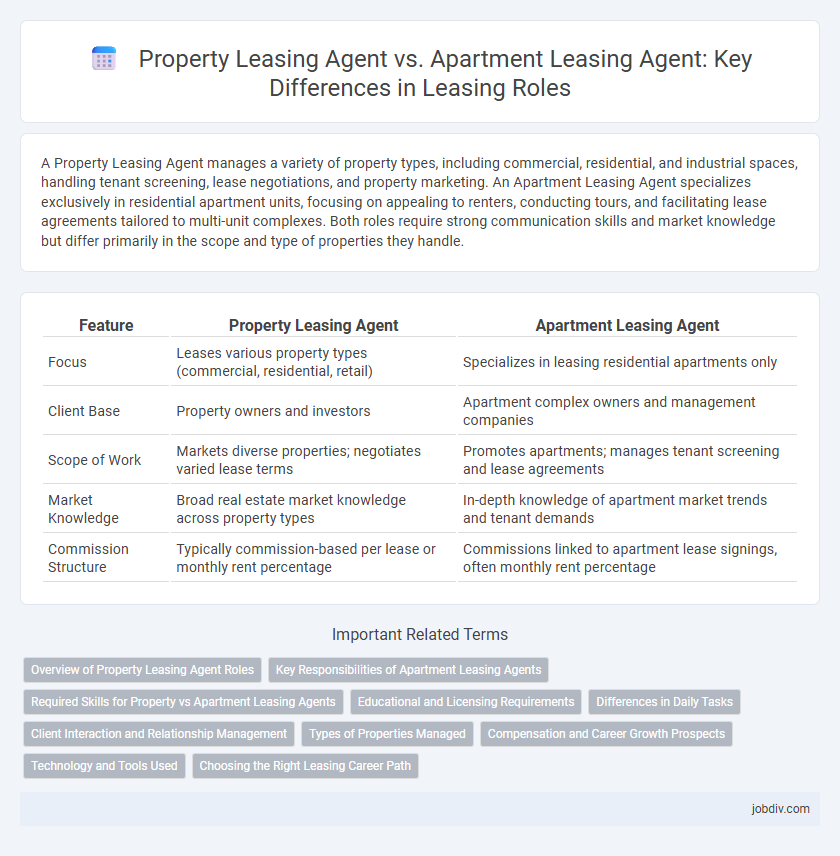A Property Leasing Agent manages a variety of property types, including commercial, residential, and industrial spaces, handling tenant screening, lease negotiations, and property marketing. An Apartment Leasing Agent specializes exclusively in residential apartment units, focusing on appealing to renters, conducting tours, and facilitating lease agreements tailored to multi-unit complexes. Both roles require strong communication skills and market knowledge but differ primarily in the scope and type of properties they handle.
Table of Comparison
| Feature | Property Leasing Agent | Apartment Leasing Agent |
|---|---|---|
| Focus | Leases various property types (commercial, residential, retail) | Specializes in leasing residential apartments only |
| Client Base | Property owners and investors | Apartment complex owners and management companies |
| Scope of Work | Markets diverse properties; negotiates varied lease terms | Promotes apartments; manages tenant screening and lease agreements |
| Market Knowledge | Broad real estate market knowledge across property types | In-depth knowledge of apartment market trends and tenant demands |
| Commission Structure | Typically commission-based per lease or monthly rent percentage | Commissions linked to apartment lease signings, often monthly rent percentage |
Overview of Property Leasing Agent Roles
Property leasing agents specialize in managing a wide range of real estate assets, including commercial, residential, and industrial properties, ensuring tenant placement and lease agreement compliance. They conduct market analysis, coordinate property showings, and negotiate rental contracts to maximize property occupancy and rental income. These agents must possess in-depth knowledge of property laws, market trends, and customer service to effectively support landlords and tenants throughout the leasing process.
Key Responsibilities of Apartment Leasing Agents
Apartment leasing agents specialize in managing rental procedures for residential units, including marketing apartments, conducting property tours, and processing tenant applications. They handle lease agreements, ensure compliance with housing regulations, and provide customer service to address tenant needs and concerns. Unlike property leasing agents, who may oversee diverse commercial and residential properties, apartment leasing agents focus specifically on optimizing occupancy rates and tenant retention within apartment complexes.
Required Skills for Property vs Apartment Leasing Agents
Property leasing agents require strong negotiation skills, market analysis expertise, and a broad understanding of various property types to cater to commercial and residential clients. Apartment leasing agents emphasize customer service proficiency, in-depth knowledge of apartment complexes, and effective communication skills to manage tenant relations and lease agreements. Both roles demand familiarity with legal leasing regulations, but apartment leasing agents often focus more on resident retention strategies and community engagement.
Educational and Licensing Requirements
Property Leasing Agents and Apartment Leasing Agents typically require a high school diploma or equivalent, but pursuing a real estate license enhances career prospects and legal compliance. Licensing requirements vary by state, generally involving pre-licensing courses, passing a state exam, and continuing education to maintain the license. Specialized training in property management, tenant relations, and leasing laws is often recommended to effectively handle leasing contracts and tenant inquiries.
Differences in Daily Tasks
Property leasing agents manage a diverse portfolio including commercial, industrial, and residential properties, coordinating viewings, handling negotiations, and processing various lease agreements. Apartment leasing agents specialize exclusively in residential apartment units, focusing on tenant screening, apartment tours, and lease renewals within multifamily housing complexes. The key difference lies in the scope of property types handled and the specific administrative tasks tailored to commercial versus residential leasing markets.
Client Interaction and Relationship Management
Property leasing agents manage a wide range of real estate assets, interacting with diverse clients including commercial tenants and property owners, which requires versatile communication skills and tailored relationship strategies. Apartment leasing agents focus specifically on residential tenants, emphasizing personalized tours, lease negotiations, and resident retention to foster long-term community engagement. Both roles demand strong client interaction abilities but differ in scope and the depth of relationship management based on the property type.
Types of Properties Managed
Property leasing agents typically manage a diverse portfolio of commercial, residential, and industrial properties, handling everything from office spaces and retail units to warehouses and multi-family residences. Apartment leasing agents specialize exclusively in residential apartment communities, focusing on tenant selection, lease agreements, and unit turnover within multi-unit rental complexes. The distinction lies in the scope of properties managed, with property leasing agents covering broader real estate assets and apartment leasing agents concentrating on apartment rental operations.
Compensation and Career Growth Prospects
Property leasing agents typically earn higher commissions due to managing a broader portfolio including commercial and residential properties, often resulting in greater overall compensation compared to apartment leasing agents who primarily focus on multi-unit residential buildings with more standardized rent structures. Career growth prospects for property leasing agents include advancing to senior management roles or branching into property management and real estate sales, while apartment leasing agents may progress to become leasing managers or regional leasing directors within residential property companies. Both roles benefit from strong interpersonal skills and market knowledge, but property leasing agents enjoy more diversified opportunities and higher earning potential due to the variety and scale of properties handled.
Technology and Tools Used
Property leasing agents leverage advanced customer relationship management (CRM) software and virtual tour technology to streamline tenant screening and property marketing across diverse real estate types. Apartment leasing agents primarily use specialized multifamily property management platforms that integrate lease tracking, maintenance requests, and tenant communication for high-volume residential complexes. Both roles increasingly adopt mobile apps and data analytics tools to enhance efficiency and improve client engagement in dynamic leasing markets.
Choosing the Right Leasing Career Path
Property leasing agents manage a broad range of real estate types including commercial, residential, and industrial properties, offering diverse career opportunities across various markets. Apartment leasing agents specialize in residential apartment complexes, focusing on tenant relations and lease agreements within multi-unit housing communities. Choosing the right leasing career path involves evaluating personal interests in property types, desired client interactions, and long-term growth potential in commercial versus residential sectors.
Property Leasing Agent vs Apartment Leasing Agent Infographic

 jobdiv.com
jobdiv.com